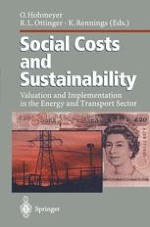1997 | OriginalPaper | Chapter
Economic and Ecological Concepts of Sustainable Development: External Costs and Sustainability Indicators
Author : Klaus Rennings
Published in: Social Costs and Sustainability
Publisher: Springer Berlin Heidelberg
Included in: Professional Book Archive
Activate our intelligent search to find suitable subject content or patents.
Select sections of text to find matching patents with Artificial Intelligence. powered by
Select sections of text to find additional relevant content using AI-assisted search. powered by
Concepts of defining and measuring sustainable development can broadly be placed in two categories: weak and strong sustainability. The concept of weak sustainability is based on neo-classical economic theory and assumes that manufactured and natural capital are close substitutes. This means that costs of environmental deterioration (e.g., forest damage) can be compensated by benefits from manufactured capital (e.g., income). Thus, environmental damages are valued in monetary units. The concept of strong sustainability denies the degree of substitution that weak sustainability assumes, at least for some critical elements of natural capital. This paper pledges for strong sustainability indicators, especially for critical loads and critical levels. Nevertheless, the costs and benefits of avoiding critical impacts have to be taken into consideration. Hence, a combination of strong and weak sustainability indicators is suggested.
